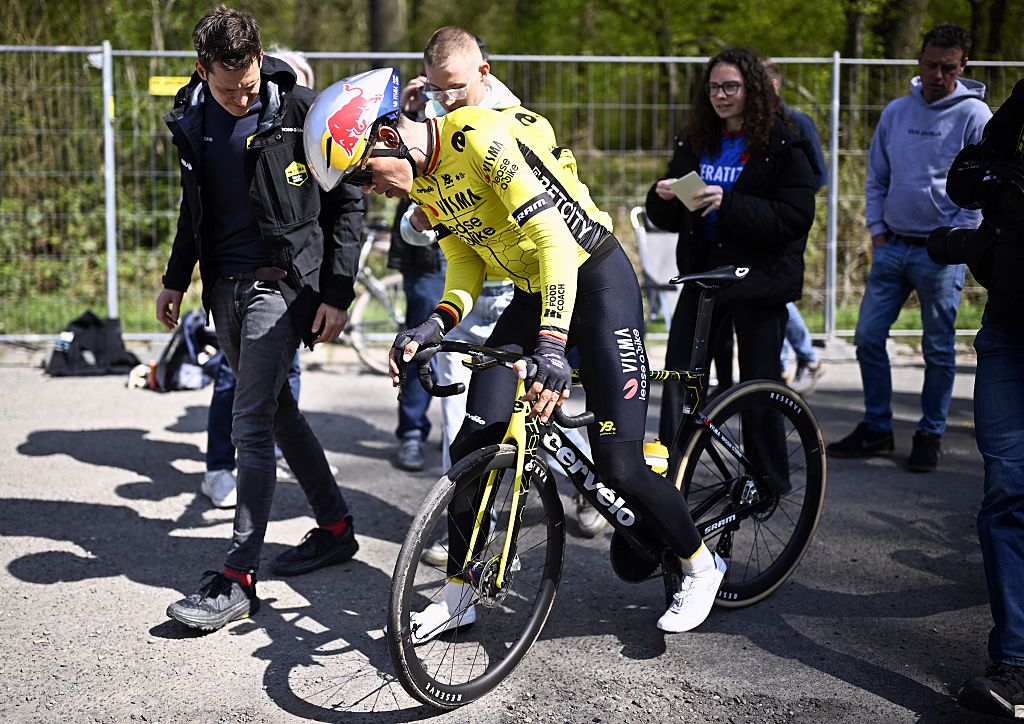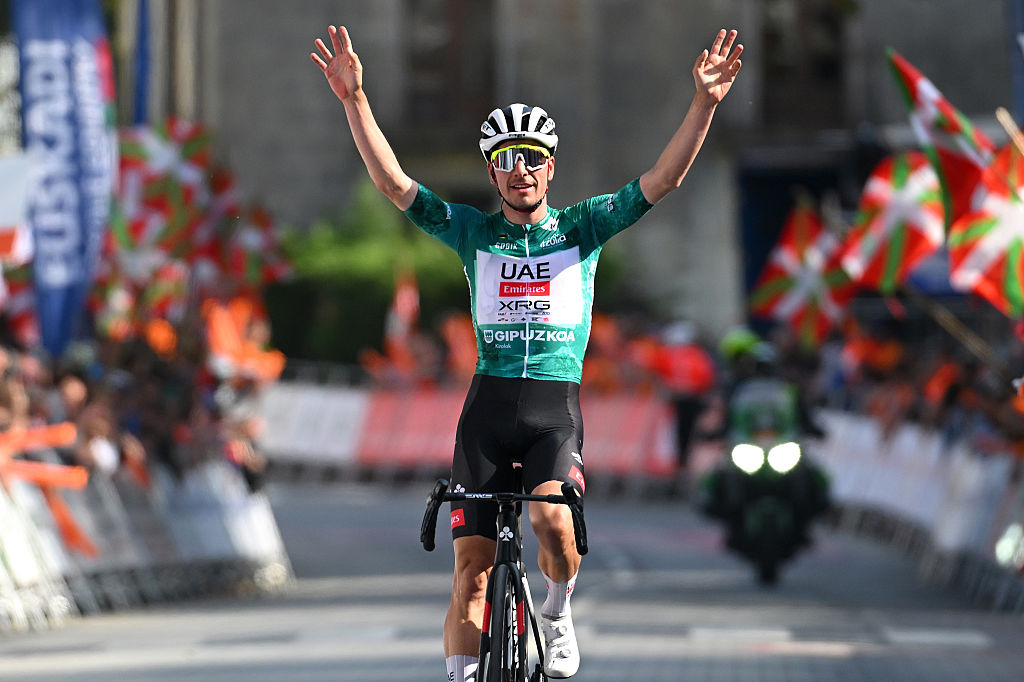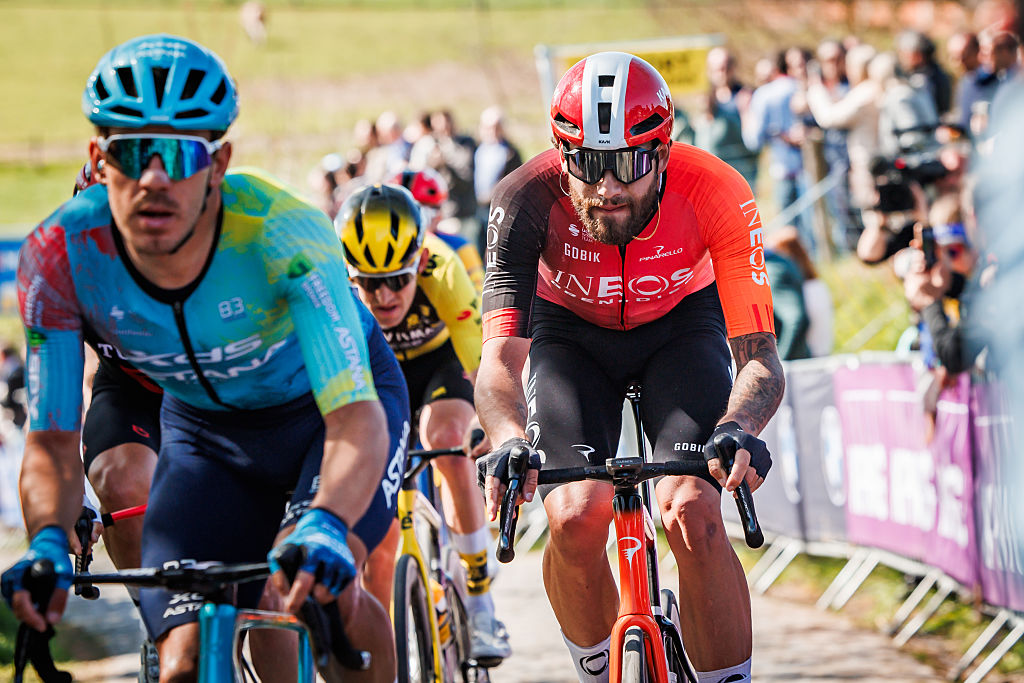Tour de France 2017: The essential preview
Our countdown to the Grand Depart starts with 10 days to go
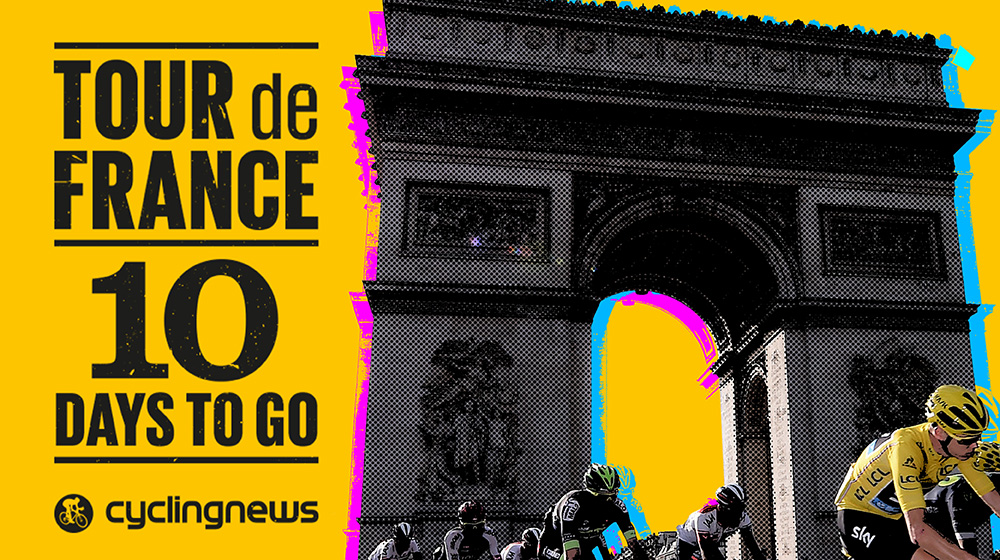
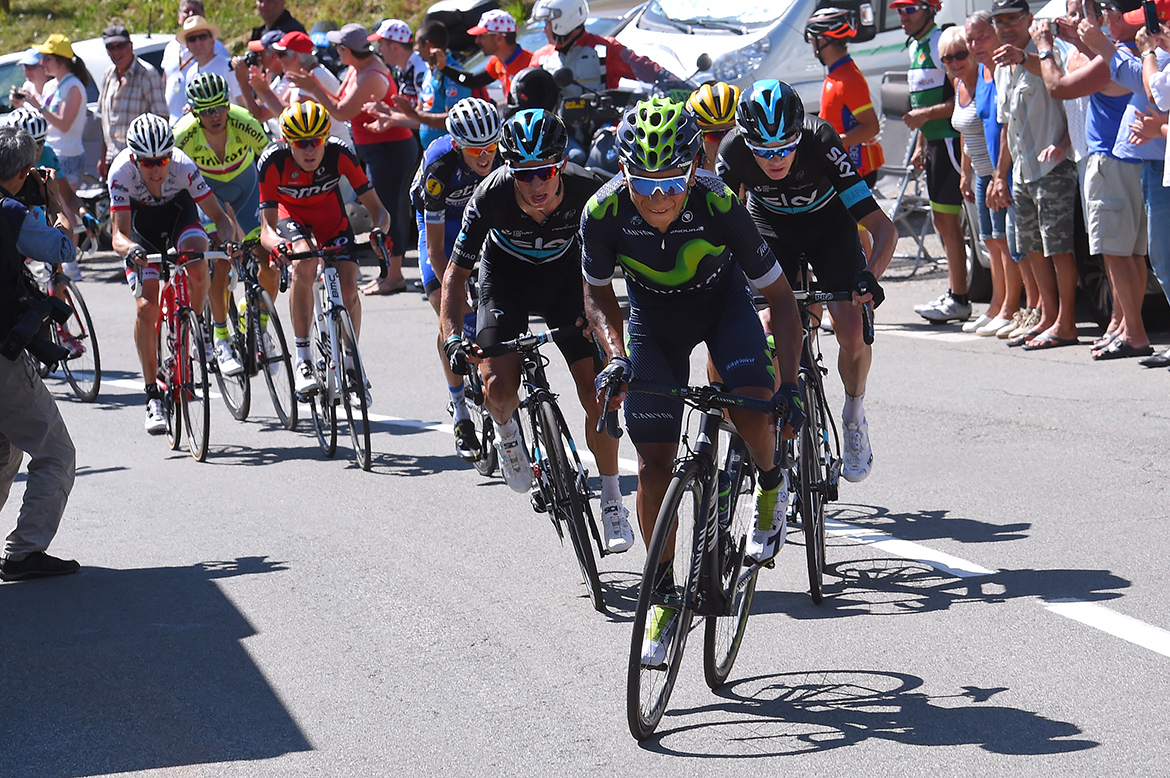
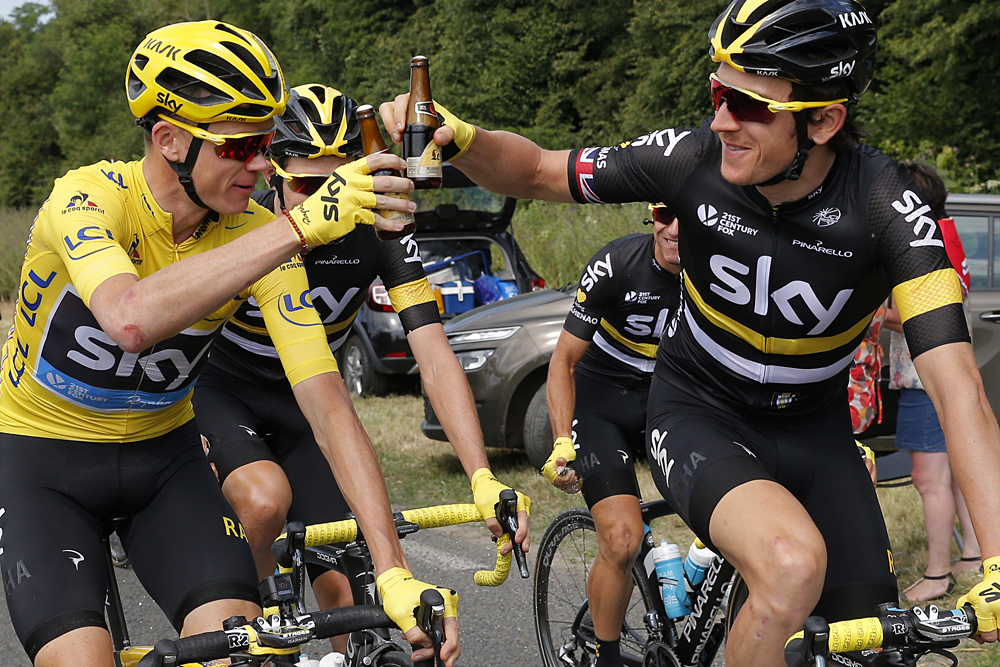
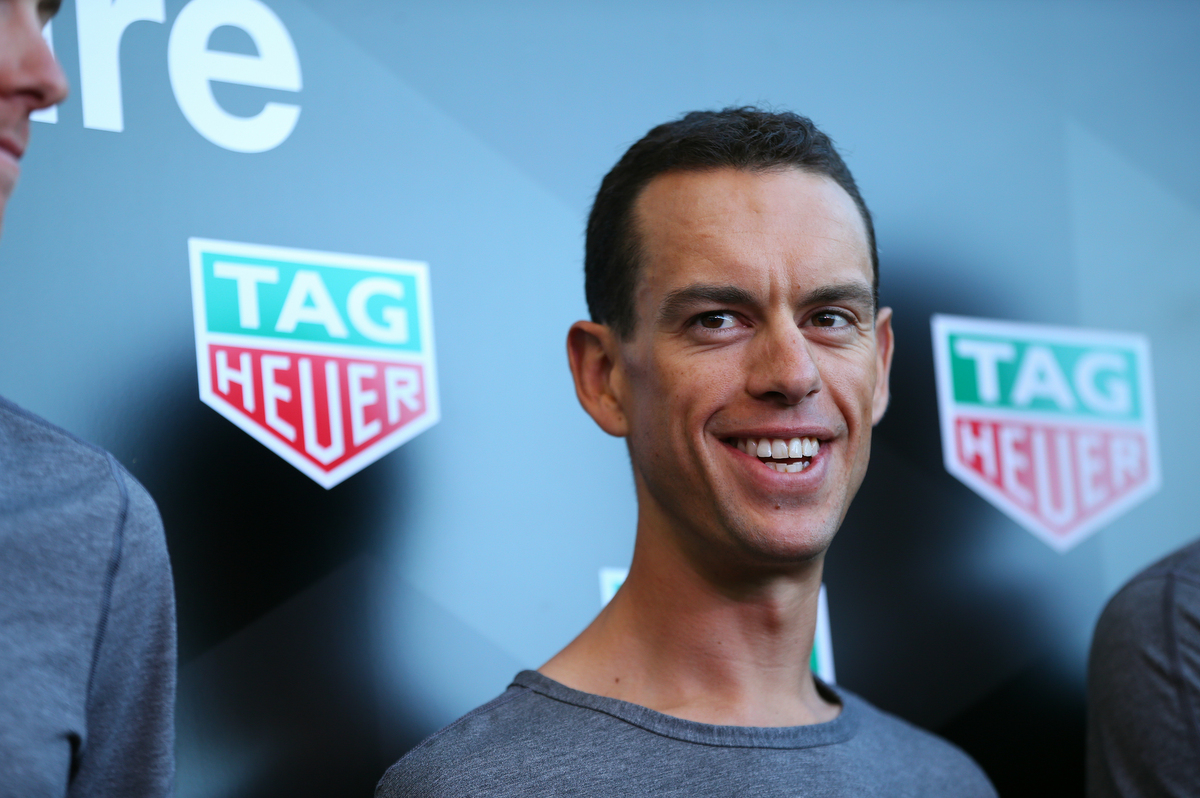
The start of the 2017 Tour de France is just 10 days away, and this essential guide and race preview marks the start of the Cyclingnews countdown to the Grand Depart in Dusseldorf, Germany. We will have special, exclusive content every day until the racing begins on July 1, when we start unmatched live coverage and race reporting.
This year the Tour de France starts with a 14km individual time trial around Dusseldorf and ends three weeks later in Paris with a final road race on the Champs Elysees. When the route of the 2017 Tour de France was first unveiled last October, the riders and teams were stunned by the inclusion of new steeper climbs in shorter but hopefully intense mountain stages in all five mountain regions of France. For the first time in 25 years, riders will face decisive stages in the Vosges and Jura before a transfer west to tackle the Pyrenees, the Massif Central and finally the Alps.
There is again no team time trial and only 36.5km of individual time trials: 14km on stage 1 in Dusseldorf and 22.5km around Marseille on stage 20, with the route seemingly tipped in favour of the climbers and aggressive overall contenders who can descend as well as they can climb.
There are only three true mountain finishes - to La Planche des Belles Filles (stage 5), Peyragudes (stage 12) and the Col d'Izoard (stage 18) - but the official road book lists 23 categorised climbs, where points will be awarded for the polka-dot jersey and attacks are likely to be made.
Time bonuses will be awarded on the road race stages, with 10, 6 and 4 seconds awarded at to the first three riders at the line. The bonuses should shake up the racing each day and perhaps even prove to be vital after three weeks and 3,540km of racing.
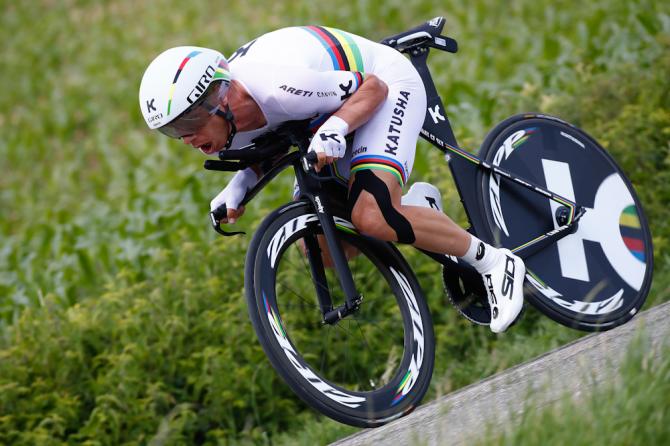
Tony Martin (Katusha-Alpein)
Who will win the first yellow jersey in Dusseldorf?
The Grand Depart begins next Wednesday when riders arrive in Dusseldorf. The racing begins on Saturday with the out-and-back 14km time trial from the Dusseldorf exhibition centre. The route includes some testing corners in the city centre and over the Rhine River, with the fastest and most daring specialist expected to pull on the first yellow jersey of the race.
Tony Martin (Katusha-Alpecin) has built his season on winning the time trial but faces competition from fellow German Marcel Kittel (Quick-Step Floors), Stefan Kung (BMC Racing), Primoz Roglic (LottoNL-Jumbo), plus US rider Taylor Phinney (Cannondale-Drapac) and Great Britain's Alex Dowsett (Movistar) if they make their teams' final selection.
The first week is one for the sprinters, the opportunists and the rouleurs, with rolling or flat stages to Liege in Belgium, a kick up the line in Longwy, and a visit to Vittel before the first mountain finish La Planche des Belles Filles. We can expect lots of fast finishes as Peter Sagan (Bora-Hansgrohe) and his sprint rivals look to wear the yellow jersey thanks to the daily time bonuses and put down a claim to the green points jersey.
The climb to the finish at La Planche des Belles Filles is only 5.9km long, but it kicks up at an average of 8.5 per cent, with several sections in double figures and a finale at 20 per cent. It will be the first showdown amongst the overall contenders. Chris Froome (Team Sky) won there in 2012, and Vincenzo Nibali (Bahrain-Merida) did the same in 2014.
Two flat stages to Troyes and Nuits-Saint-Georges lead into the Jura mountains and a finish at the Les Rousses ski resort close to the border with Switzerland. However, it is stage 9 to Chambery and its 4,600m of climbing that everyone will fear. The 181.5km stage includes the Grand Colombier from the Virieu-le-Petit side, with a section of road at 22 per cent, followed by the terrible Mont du Chat - 8.8km at 10 per cent - that was recently covered at the Criterium du Dauphine and saw a string of attacks on the climb and treacherous descent.
The first rest day comes on Monday July 10, with the riders taking a plane transfer west across France to Perigueux near Bordeaux.
Three hot and hilly days take the race east across the south of France via Rodez, Le Puy-en-Velay and Romans-sur-Isère, with the tiny village of Le Puy-en-Velay in the Haute-Loire also hosting the second rest day on Monday, July 17. It will offer little respite for tired legs, with the final fight for the yellow coming in the Alps.
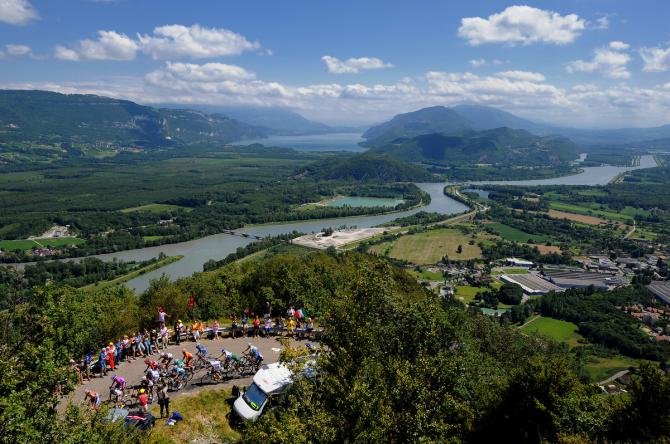
The Col du Grand Colombier made its debut at the 2012 Tour
The Alpine double whammy before the Marseille time trial
The double whammy of mountain stages begin with stage 17 to Serre Chevalier in the Hautes Alpes. The 183km stage includes the Col de la Croix de Fer and then the Telegraph and the Galibier up to the 2642m summit before a fast descent to the finish near Briancon.
Next up is the final big mountain stage of the race to the summit of the iconic Col d'Izoard in the heart of the Alps. The 179.5km stage will also include the Guillestre, Barcelonnette and the Col de Vars climbs before the ascent to the finish at 2,360m after passing through the moonlike landscapes of the Casse Déserte area made famous by the Tour de France in black and white images from the 1950s and 1960s. This stage will host the Etape du Tour sportif on July 14 and the women's La Course race, which moves from Paris and the Champs Elysees to the Alps. It could be a legendary stage in the 104 editions of the Tour.
A largely downhill transfer stage takes the race to Salone-en-Provence and so Marseille for the decisive 22.5km time trial stage around the Mediterranean city. The start and finish is in the Marseille velodrome football stadium, as race organisers ASO offer a new way of enjoying the race and possibly a future way of earning some ticket sales.
The time trial is relatively short, but time gaps could still be significant due to the numerous corners along the out-and-back route to the city centre. Cyclingnews counted 23 corners on the official route map with other curves and the sea breeze likely to play a factor in the stage result and perhaps the final overall result of the Tour de France.
A final long transfer from Marseille to Paris on Sunday morning takes the race to the French capital for the now traditional final evening 103km road stage, the expected and highly contested final sprint and the podium ceremony and celebrations on the Champs Elysees.
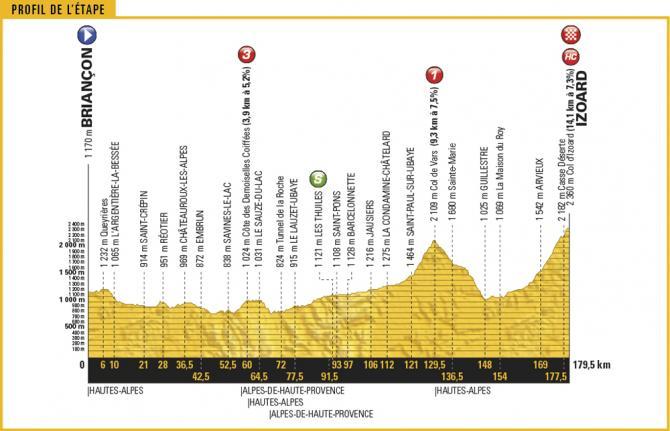
Stage 18 profile
The battles to watch for, the names to remember
The Tour de France offers a multitude of racing within the overall race.
As well as the fight on time for the yellow jersey, there is also the battle for the stage victory, the tussle for daily points and the green jersey, for the mountain points and the polka-dot jersey and also the best under-25 young rider's white jersey.
The green jersey will be of special interest this year as Sagan tries to equal Erik Zabel's record of six. He has often dominated the competition but faces some real opposition from Michael Matthews (Team Sunweb), Greg van Avermaet (BMC) and possibly Sonny Colbrelli (Bahrain-Merida), John Degenkolb (Trek-Segafredo), Andre Greipel (Lotto Soudal), Alexander Kristoff (Katusha-Alpecin), Arnaud Demare (FDJ) and Edvald Boasson Hagen (Dimension Data). They will all contest the sprint finishes along with Kittel, perhaps Mark Cavendish (Dimension Data), Nacer Bouhanni (Cofidis) and Dylan Groenewegen (LottoNL-Jumbo).
Froome is targeting a fourth overall victory but he faces some serious competition. His lack of brilliant form and a lack of success so far in 2017 suggests that rivals Richie Porte (BMC Racing), Nairo Quintana (Movistar), Alberto Contador (Trek-Segafredo) and Romain Bardet (AG2R-La Mondiale) could all have a chance to beat him. However, they all have weaknesses that could cost them dearly; Porte could crack under pressure, Bardet is fragile like a sparrow, Quintana has the Giro d'Italia in his legs and Contador is in the final years of his career.
Behind them there are the likes of Esteban Chaves and Simon Yates (Orica-Scott), Fabio Aru and Jakob Fuglsang (Astana), Rafal Majka (Bora-Hansgrohe), Rigoberto Uran and Andrew Talansky (Cannondale-Drapac), Alejandro Valverde (Movistar), Dan Martin (Quick-Step Floors), Louis Meintjes (UAE Team Emirates), George Bennett (LottoNL-Jumbo) and others fighting for prestigious stage victories in the mountains and a place in the top 10 overall.
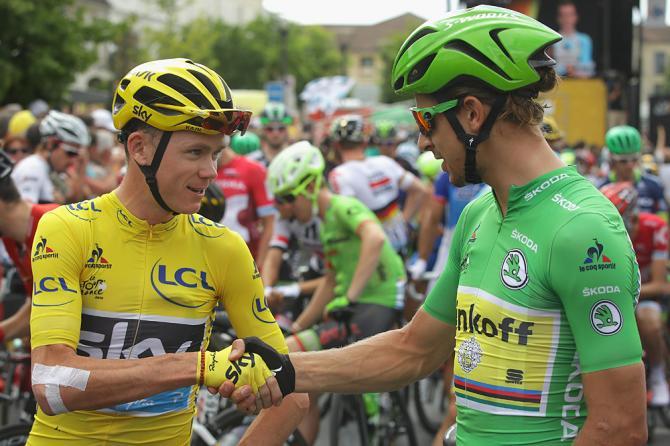
Chris Froome and Peter Sagan greet each other before the final stage of the 2016 Tour
A contrast of strengths and weaknesses
Porte has looked unbeatable for much of the season but then was put to the sword by Fuglsang and his other rivals at the Criterium du Dauphine. He was isolated in the finale of the key mountain stage and the strength of his BMC team will be vital if he wants to follow on from Cadel Evans as the second Australian Tour de France winner.
Froome is expected to be ready when he arrives in Dusseldorf next week and in the final Alpine stages when the Tour will be decided. However, it will be fascinating to see if and how his slow spring and the investigation into Team Sky by UK Anti-Doping have weakened his chances.
Quintana sneaked away from the Giro d'Italia podium in disappointment, apparently staying in Monaco and recently doing an Alpine recon trip rather than heading home to Colombia. The Movistar master plan was to use the Giro d'Italia to lift his form to another level. We will soon find out if it has worked and if he can stop a hoped-for Grand Tour double from turning into into a double flop.
Contador could race on in 2018, but after turning professional way back in 2003 and turning 35 in December, there is a distinct sense that this year is his final shot at another Tour de France victory. However, his last win was in 2009 and he has often stumbled since then.
Froome, Porte, Contador, Bardet and Quintana will perhaps fight for the final podium spots, but it would crazy to dismiss Chaves, Yates, Martin, Valverde, Aru, Fuglsang and even Thibaut Pinot (FDJ), who will in theory target stage victories but could still emerge strong.
We might not see a clash of the titans in July, and this year's Tour de France may not go down in history books, but the lack of time trial kilometres, the far more unpredictable route and the nuances of the riders' form, their strengths and weaknesses, should make for a great three weeks of racing.
Vive Le Tour!
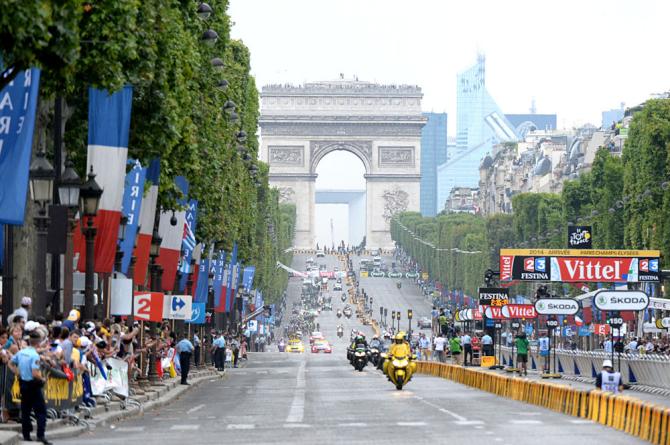
Get The Leadout Newsletter
The latest race content, interviews, features, reviews and expert buying guides, direct to your inbox!

Stephen is one of the most experienced member of the Cyclingnews team, having reported on professional cycling since 1994. He has been Head of News at Cyclingnews since 2022, before which he held the position of European editor since 2012 and previously worked for Reuters, Shift Active Media, and CyclingWeekly, among other publications.
Latest on Cyclingnews
-
Wout van Aert has a wild ride during Paris-Roubaix reconnaissance - Video
Belgian suffers a puncture and nearly crashes in the Arenberg Forest -
As it happened: Change in leadership at Itzulia Basque Country as stage won with successful solo attack
The peloton tackles the mountainous 169.6km race from Beasain to Markina-Xemein -
Itzulia Basque Country: João Almeida rides away from rivals on final climb to deliver solo stage 4 victory, takes overall race lead
UAE Team Emirates-XRG teammate Isaac del Toro takes second from chase-group sprint, Maximilian Schachmann finishes third and loses leader's jersey to Almeida -
'Paris-Roubaix is like being in a washing machine' - Filippo Ganna revs his engine during final cobbled recon ride
Italian leads Ineos Grenadiers in his final Classic of the spring
